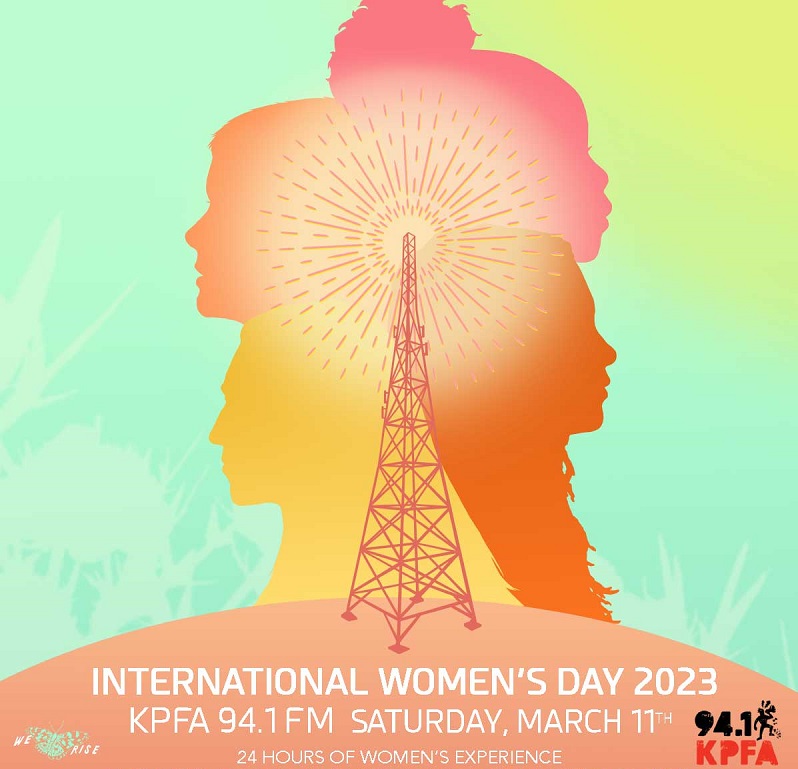
On Saturday, March 11th, only shows about women will be heard for 24 hours on KPFA-Pacifica in Berkeley, California. From midnight to midnight, International Women’s Day will be celebrated with nonstop shows that are produced, engineered, and hosted by women at KPFA-Pacifica who are collaborating with other women from around the world, including producers throughout Pacifica Network, independent production groups, and podcasts. The marathon will be heard on KPFA’s airwaves at 94.1 FM in the Bay Area and at kpfa.org. It will include interviews with women on issues from around the world along with women’s music.
Leading the production are KPFA news anchor Christina Anstead, Lisa Dettmer, KPFA producer and host Paula Burch, who is in training for production at KPFA, and Darlene Pagano, a producer trained at KPFA who is also now on KPFA’s local station board.
“International Women’s Day is a global holiday with radical origins,” explains Lisa Dettmer, “it was first observed as National Women’s Day in 1909 by the Socialist Party of America in New York City. Its observance spread to Germany, Denmark, Austria, Switzerland, where there were large socialist movements with women contingents.”
Observance was held on various days. When, in 1917, women gained suffrage with the Provisional Government of the Russian Revolution, they designated March 8th as the International Women’s Day holiday. It has been celebrated on that day by socialist movements ever since – and in the United States, more as a workers’ celebration. In the 1960’s, the global feminist movement adopted it and the holiday became mainstream throughout the world, following its adoption by the United Nations in 1977.
“When I moved here to the Bay Area 1988, we would have 5,000 people in the street on International Women’s Day, so it was something that had real significance,” recalls Dettmer. “People in the streets addressed violence against women, reproductive rights, and gender equality. Also, I remember us demonstrating in front of large corporations who supported things like apartheid. So the day incorporated kind of a leftist analysis as well.”
Although International Women’s Day is a serious event in many countries, interest in the USA has just kind of dwindled. When asked why the women at KPFA volunteer every year to celebrate International Women’s Day, Dettmer says, “We’re trying to revive International Women’s Day in the USA and we hope to bring in people from all different parts of the world. I do this because I want to see feminist voices on the air. I’m a Marxist, lesbian feminist,” she continues, “it’s a radical perspective and I want this to mean something to young women. If I don’t do it, it, that may not happen.” As part of a women’s radio collective, Dettmer co-founded, produces and hosts Women’s Magazine / Feminist Voices, which she says is KPFA’s “only multiracial, intersectional, and radical feminist show.”
In January, when the team at KPFA started organizing this year’s International Women’s Day broadcast, they reached out across Pacifica Network for story pitches. Pacifica Network includes more than 200 community radio stations and many independent production groups. The KPFA team have worked with the chosen producers and radio hosts to develop the radio content. Some are repeat collaborators from previous years.
Dettmer says producing the event is opportunity for her to interview people “I would never get to talk to,” like historic leaders from Black Power movement or renowned women musicians. “Just yesterday,” she continues, “I was doing outreach for this and went to a class at UC Berkeley. The students don’t listen to radio, and none of them had heard of KPFA. But I had people come up to me afterwards saying they were interested in getting involved. I think that young women are interested in KPFA’s format where people are doing things not for money but because they believe in them.”
When asked if International Women’s Day will continue in the future despite the toll it takes on it’s volunteer organizers, Lisa Dittmer says, “Of course! But we hope to eventually find funding for it so we can hire an executive producer, so we can do more and fully do the day justice. I wish it would grow beyond KPFA to be a national production of Pacifica. I think this special programming is important and it’s part of the mission of Pacifica.”
Most of the shows produced for KPFA’s International Women’s Day marathon have been available to Pacifica’s other stations and Pacifica’s affiliates, to air at their discretion. Some topics covered:
International Women’s Day around the world
Women’s Protest Music
Race and feminism
Feminist folktales
Asian women’s identity
Access to Abortion in the post-Roe landscape
A socialist perspective on abortion
Rape Culture and the issue of consent
Ukrainian mothers
Survival in the war in Ukraine Indigenous Woman envisioning rematriation
Middle eastern feminism
Celebration of menstruation in India and the world
Masculine women claiming their space
when judges dismiss claims of domestic abuse
Reproductive justice and black women
Reproductive freedom and mental health
Working in the skilled trades
Women’s rock music
Reproductive rights and voting
